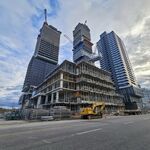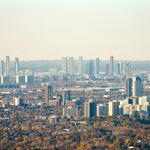I’m glad these things are getting highlighted, because they show what awaits our government if they want to actually push forward- but I am not trying to claim these things are easy or even the “best path”. They are pragmatic, mere mechanisms with which the actions taking place can be justified, even perhaps in the public interest. Does Ford have the ability to meet the specs he stated at a price like that? Unlikely; but he did take land out of the greenbelt, which was also no small feat. With some typical political flecility for what will actually be built and the affordabilityIt is not inconceivable that Ford could throw subsidies at these lands until they are at that price if it will make the election difference.
And, if there actually is a case that the greenbelt can be improved in its mandate, it serves to only become more rigorous after the fact if we take another look (publically, of course) at actual data. We should at least be open to the notion; even if we have been presented an unsubstantiated, evidence-less course of action, we cannot dismiss the possibility that there is substance and evidence, especially with how steadfast Ford has been. Ideally, that would come to light and we could democratically decide what to do now that the cat has been let out the box.
The Ontario government has so many better tools at its disposal.
Aside from the typical, and obvious (build more deeply affordable housing, curtail demand, and raise wages (by reducing labour supply and raising minimum wage).......
They could:
1) Buy an existing REIT and simply convert it to mixed income public housing (lowering the rents of existing tenants or on vacant units as guidelines would have one do.
This might seem far fetched; but Capreit is only 8 billion in market cap. Ontario could recover a chunk of that selling off out of province assets. But it would instantly pick up 24,000 units in province.
For a net-out cost of say ~3B, that's only $125,000 per unit; way cheaper than you could ever build new.
If just 20% of those units represented people being removed from a 'high needs' category/housing waiting list, that's about 4,800 apartments/households and about 6,700 people no longer in acute poverty. That's great bang for the buck.
2) If the province wants to create cash through land value, such that they can reallocate that to pay for new public housing/coop housing, and/or buying REITs..... that too isn't hard, the province has already shown the way with the TOC along the Ontario Line, except that they're doing a crap job of securing affordable housing as part of that.
But just imagine the province, say, buying a bunch of low-density sites near Ossington Station on Line 2, at market value, but with expropriation, so it moves quick. They assemble say 2ha/5 acres, they MZO it to medium or hirise density and MCR.
Say that's 100 houses at 1.3M a pop or about 130M, with the simple MZO, that land just tripled in value, very conservatively, you flip it to a developer and take your choice:
a) Bank the 260M net profit and invest that in new build public housing
b) Sell to the developer at cost, in exchange for 260M of in-kind affordable housing, and 100% purpose-built rental.
That's roughly 1,000 units of affordable rental housing, depending on the rent level set.
Rinse, repeat 30 times across Toronto and you get 30,000 units of affordable housing for a cash--out lay of only 3.9B; you do that through the value-creation of the MZO and the instant-assembly of expropriation.




